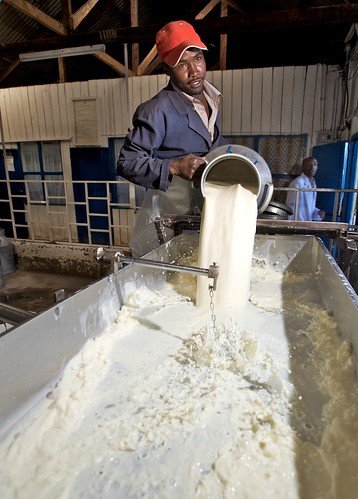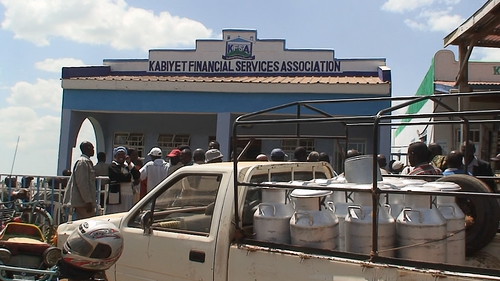 |
| Milk reception at Nyala dairy plant in Kenya (photo credit: East Africa Dairy Development project) |
A new study on agricultural innovation systems takes an in-depth look at the East Africa Dairy Development project and its innovative approach to enhancing dairy farmers' access to inputs, credit and animal health services.
The study, published in the June 2013 issue of the journal Agricultural Systems, was lead authored by Catherine Kilelu, a PhD student at Wageningen University who was hosted at the International Livestock Research Institute (ILRI) as a graduate fellow.
Started in January 2008, the East Africa Dairy Development project is working in Kenya, Rwanda and Uganda to transform the lives of 179,000 families (about 1 million people) by doubling household dairy income in 10 years through integrated interventions in dairy production, market access and knowledge application.
The project is funded by the Bill & Melinda Gates Foundation and implemented by Heifer International, African Breeders Services - Total Cattle Management, TechnoServe, the World Agroforestry Centre and ILRI.
The project helped set up dairy farmer business associations with milk chilling plants. These serve as local business hubs where farmers can easily access credit, farm inputs, artificial insemination services, animal feeds as well as training on dairy production.
Following are the key highlights of the study:
Citation
Kilelu CW, Klerkx L and Leeuwis C. 2013. Unravelling the role of innovation platforms in supporting co-evolution of innovation: Contributions and tensions in a smallholder dairy development programme. Agricultural Systems 118: 65-77.
The study, published in the June 2013 issue of the journal Agricultural Systems, was lead authored by Catherine Kilelu, a PhD student at Wageningen University who was hosted at the International Livestock Research Institute (ILRI) as a graduate fellow.
Started in January 2008, the East Africa Dairy Development project is working in Kenya, Rwanda and Uganda to transform the lives of 179,000 families (about 1 million people) by doubling household dairy income in 10 years through integrated interventions in dairy production, market access and knowledge application.
The project is funded by the Bill & Melinda Gates Foundation and implemented by Heifer International, African Breeders Services - Total Cattle Management, TechnoServe, the World Agroforestry Centre and ILRI.
The project helped set up dairy farmer business associations with milk chilling plants. These serve as local business hubs where farmers can easily access credit, farm inputs, artificial insemination services, animal feeds as well as training on dairy production.
Following are the key highlights of the study:
- Innovation platforms support co-evolution of innovation.
- Innovation platforms can be considered sets of intermediaries.
- Dynamism and unpredictability of innovation requires platforms to be adaptive.
- Feedback and learning in platforms needs to be better monitored.
- Agricultural innovation policies should be better tailored to co-evolution.
Citation
Kilelu CW, Klerkx L and Leeuwis C. 2013. Unravelling the role of innovation platforms in supporting co-evolution of innovation: Contributions and tensions in a smallholder dairy development programme. Agricultural Systems 118: 65-77.

